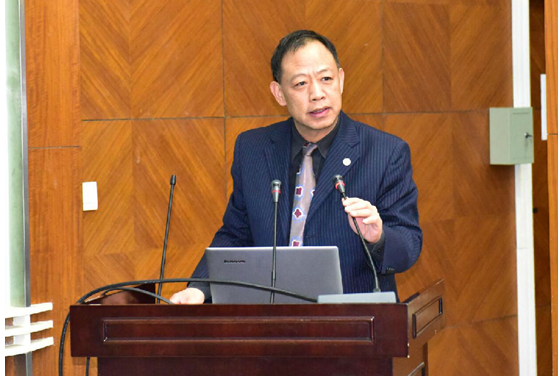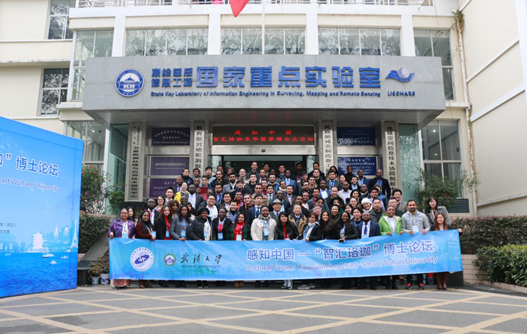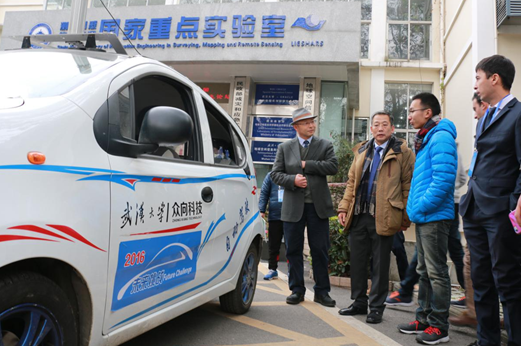There once was a road that crossed great deserts; traversed mighty mountains; braved strong winds and overcame vast oceans. There once was a road that represented a wealth of culture and capital, perpetuating peace and spreading good-will to all within its reach.
The road now has a new name — “One Belt One Road”, which symbolizes trust and understanding among countries as well as integration and openness of the whole area. Against this background, the “Experiencing China - Smart WHU” Forum was held for the first time on 18th December 2016 on WHU campus, which seeks to introduce all the success and progress of not only WHU, but also a number of other universities, in the fields of remote-sensing cartography, international economics and international relations.
In his opening speech, Vice President Li Fei said that Wuhan University welcomes a new array of exciting opportunities and challenges. In addition, he expected that this forum would contribute to solutions for problems arisen from development and better international cooperation. There is no doubt that WHU has taken the “One Belt One Road” initiative as a turning point and a calling for change. Employing scientific progress and development as a compass, WHU now moves towards a broader world stage.

Vice President Li Fei is delivering the opening speech for the forum
WHU has established itself as a comprehensive, research-oriented, globalized academic institute. For this very reason, China Scholarship Council (CSC) decided to hold the Doctoral Forum, one of a series of events on “Experiencing China”. “We hope that this Forum will become a well-known tradition” said Wang Shenggang, the Deputy Secretary-General of CSC.
Two hundred international PhD students from several universities in Wuhan city participated in this event. Among them, four students were chosen to be the honored keynote speakers.
The first speaker is Mr Michael Jendryke from German who is currently a PhD student in Wuhan University’s State Key Laboratory of Information Engineering in Surveying, Mapping and Remote Sensing (LIESMRS). Standing in the stage of LIESMARS, he shows the debonair feeling.
Michael’s speech centered on the benefits of geographical space technology for the Belt and Road Initiative. He begun with an introduction to the basics of remote sensing, then moved on to its merits: large-area coverage, land-cover change detection, time series for long time monitoring and accurate assessment of resources.
He then raised a question to the audience, “How can we monitor the socioeconomic development along the belt and road?” The question arose the interests of some, who answered his question. In this way, Micheal introduced the “night-time light detection” whose change in the past decades reveals some interesting economic development patterns in the B&R region.
At last, Micheal shared his personal plan: “I plan to stay connected with China, maintain a relationship with LIESMARS and Wuhan University and continue to work in the field of Geospatial Technology.” He also made a self-mockery, “It’s a pity for me that I haven’t crossed out ‘learn Chinese’ from my checklist.”
A PhD from Central China Normal University named Silva said, “I was totally impressed by Micheal, I learn Diplomacy and don’t know much about this technical area, but he introduced a lot. It’s an awesome chance.”

Group photo taken outside of the LIESMRS
Sujeewa Vijayanthi Polgmpala,a PHD student from Huazhong University of Science and Technology gave a speech titled “The New Dynamics in Sri Lanka with Integration into the Belt and Road”. She put the emphasis on the bilateral relationship between China and Sri Lanka over decades, “China-Sri Lanka relations will rise to new heights as diplomatic relations between the two countries will witness 60 years next year.”
She also illustrated her own ideas of the goal of “One belt, One road”— to develop the regional economy, make use of foreign exchange reserve, absolve the surplus, drive capacity output by capital output and deepen international cooperation.
“The idea of One belt and One road is based mainly on the economy, but has political and strategic components and implications. It aims for the joint development, common prosperity and energy security” said Sujeewa.
The third speaker is Nawab Khan, a PhD candidate from Zhongnan University of Economics and Law majoring in Accounting. He talked about the China-Pakistan economic corridor and cooperation fields, “There is no doubt that China and Pakistan share a time-tested and all-weather friendship that is deeper than oceans and higher than mountains.”
He compared the China-Pakistan relationship to “Irons Brother” in Chinese proverb. “It’s an example for the world in terms of diplomatic relations. This relationship is multi-facets from education to economy and from science to culture.”
The last one, Jully Goh, a PhD student major in Comparative Literature from Central China Normal University, discussed the issue of “The spread and Acceptance of Modern and Contemporary Chinese Literature in Malaysia under the One belt One road strategy”.
The issue occurred to her several weeks ago the time before she received the invitation to be the speaker. “Modern and Contemporary Chinese Literature has a huge impact on Malaysia, for instance, Mo Yan's novel.” She discussed the historical development of Chinese literature and Chinese language education in Malaysia.
“Each school will choose 10 candidates at first but only one student can represent at last.”said Jully, “I am extremely thrilled the time I know that I have been chosen. Hope more students will participate in the forum the last year.”

Student from LIESMRS introduced the driverless car designed by the lab
When asked about the history of Experiencing China, Wang Shenggang answered “‘Experiencing China - Smart WHU’ aims at promoting international students’ participation in social development and cultural exchange. More than 150 summits or lectures have been held in 2015, consisting of a series of different activities.”
From his perspective, the number of international students will break through five hundred thousand before 2020, “The goal will be achieved ahead of schedule from the supports of Chinese government.”
When spoke of his impression about Wuhan University, he smiled and answered that, “I can clearly sense the strong academic atmosphere here, and nobody can deny that it is the just place to hold such activities.”
Some students were observing the robots and unmanned aerial vehicle which were exhibited in public by the laboratory. So Wang continued, “Wuhan University’s State Key Laboratory of Information Engineering in surveying, Mapping and Remote Sensing is among the top in the country, and has already accomplished countless achievements, which is sure to be one of the main drive for growth on the world stage for WHU.”
But he also commented that, “International exchange is definitely salutary and will bring vigor for academic development. I cling to a belief that the forum will be open to more WHUers next year.”
(Photo by Shi Weimin, edited by Fang Siyuan, Zheng Xinnian & Hu Sijia)